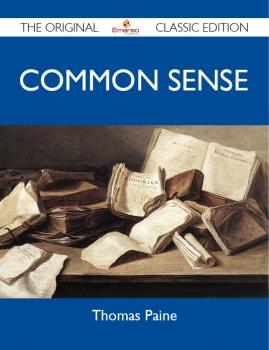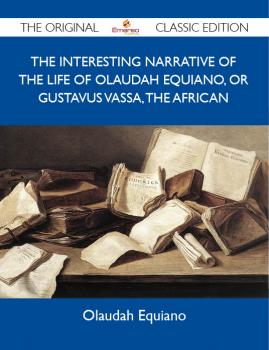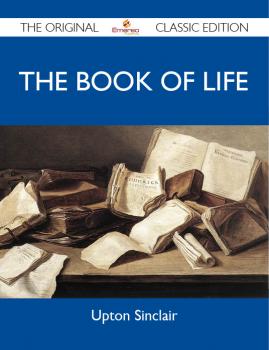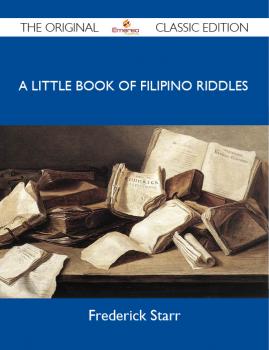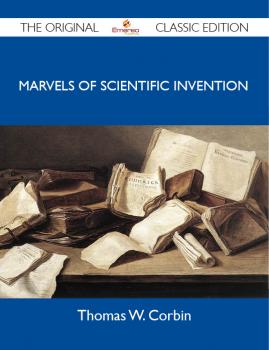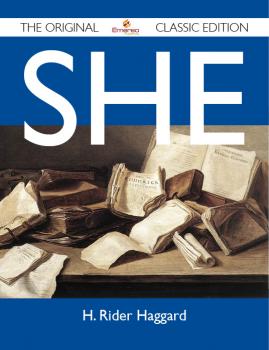Ingram
Все книги издательства IngramCommon Sense - The Original Classic Edition
Common Sense is one of the greatest publications of argumentation ever written. Paine was the finest writer of his age and was able to turn the discontents of the colonists and, especially, the intellectual leaders of the revolutionary movement into arguments that were easily understood by ordinary colonials and which inspired them to rally to the cause of independence. <p> You will notice the fluidity of his writing; it reads as simply, directly and forcefully today as it must have nearly a quarter of a millennium ago. Obviously, one did not have to be a great reader to be swayed by the force of Paines words or to be inspired to the side of those wishing to throw off the English yoke. <p> You will find echoes of Paine in many great American speeches that will run through your mind as you read. A number of quotes from Robert F. Kennedy seemed to have been directly inspired by Common Sense: <p> It is not enough to understand, or to see clearly. The future will be shaped in the arena of human activity, by those willing to commit their minds and their bodies to the task. <p> All of us might wish at times that we lived in a more tranquil world, but we dont. And if our times are difficult and perplexing, so are they challenging and filled with opportunity. <p> The Declaration of Independence itself is a direct offspring of this great tract. Jefferson and the others charged with developing the document were well aware of Paine and had the opportunity to evaluate his words and to use his methods in creating our declaration, and this takes nothing away from their genius.
An Ideal Husband - The Original Classic Edition
Oscar Wilde gives us here one of his best plays. He explores the political world in London and how a young ambitious but poor man can commit a crime, which is a mistake, to start his good fortune. But he builds his political career on ethical principles. Sooner or later someone will come into the picture to blackmail him into supporting an unacceptable scheme, by producing a document that could ruin his career if revealed. <p> His past mistake may come back heavily onto him. But he resists and sticks to his moral reputation. He prefers doing what is right to yielding to some menace. He may lose though his political ambition and career and his wifes love. But love is saved by forgiveness and the mans career is also saved by the work of a real friend who recaptures the dubious document and destroys it. In other words love and an ethical career are saved by the burrying of the old mistake into oblivion. In other words love and friendship are stronger than the scheming action of a blackmailer. <p> This is a terrible criticism of victorian society which is based more on appearances than principles and yet able to destroy a mans absolutely ethical present life with a mistake from his youth, throwing the baby along with the water of the bath. It is also a criticism of the victorian political world where you cannot have a career if you are not rich, money appearing as the only way to succeed, at least to succeed fast. But it is a hopeful play because love and friendship are beyond such considerations and only consider the best interest of men and women, in the long run and in the name of absolute purity. Better be a sinner and be forgiven when you have reformed than see a reformed sinner destroyed by the lack of forgiveness. <p> Oscar Wilde advocates here a vision of humanity that necessitates forgiveness as the essential fuel of any rational approach. Real morality is not the everlasting guilt of a sinner without any possible reform. Real morality is the recognition that forgiveness is necessary when reform has taken place. Otherwise society would be unlivable and based on hypocrisy and the death or rejection of the best people in the name of (reformed) mistakes. One must not be that sectarian, because man can learn from his mistakes and improve along the road : one can learn how to avoid mistakes and repair those oen has committed. If condemnation is absolute, no progress is possible. <p> A very fascinating play, a very modern play. And yet when can one be considered as reformed, when can we consider one has really corrected ones mistakes and improved ? And who can deem such elements ? The very core of political and ethical rectitude is concerned here and Oscar Wilde embraces a generous approach.
Personal Memoirs of U. S. Grant - The Original Classic Edition
One of the Best Books Available on the Civil War : This book will keep you turning the pages from end to end. Despite its bulk you simply cant put the book down, as Grants matter-of-fact description of the events that surrounded him was completely engrossing. <p> Grant was not an extraordinary man or brilliant tactician, his soldiers did not have the same obsession with him that the South held for Lee, he simply saw the war for what it was, a campaign against a rebellion. He looked at the entire war in its entirety, from battlefront to battlefront, and he repeatedly used that to his advantage. Many times he makes reference to deploying troops to no clear end other than to occupy an enemies flank, this often as a junior with no authority over the battle as a whole. Grant was a man of action, who realized he had to take a step in order to walk a mile. He took the battle to the enemy, divised clear and necessary steps which were needed to win the war as a whole. He was a general who did not just see the war as independent sets of battles, but saw those battles as a means to ending the Civil War. <p> One of my favorite parts of the text was watching the scope of Grants vision widen. Starting with his actions in the Mexican American War his vision is very limited: he sees only the immediate battle, and his descriptions focus on minutiae reflecting his low rank. His vision escalates with his rank, until the end of the book, with the surrender of Lee, he sees and describes the entire army, and battles that would have once taken chapters to described are now dismissed in single sentences. <p> I wish that there were similar autobiographies by other presidents, and certainly feel that this one elevated my expectations of all other autobiographies! <p> Favorite Excerpts: <p> It is men who wait to be selected, and not those who seek, from whom we may always expect the most efficient service. – Grant <p> All he wanted or had ever wanted was some one who would take the responsibility and act, and call on him for all the assistance needed, pledging himself to use all the power of the government in rendering such assistance. – Grant on Lincoln <p> Wars product many stories of fiction, some of which are told until they are believed to be true. – Grant <p> To maintain peace in the future it is necessary to be prepared for war. – Grant <p> The war begot a spirit of independence and enterprise. The feeling now is, that a youth must cut loose from his old surroundings to enable him to get up in the world. – Grant
Black Beauty - The Original Classic Edition
A Memorable Childrens Novel with Important Values: We often talk about teaching children values, but in most cases childrens literature is insipid and of no lasting value. BLACK BEAUTY, however, is both valuable as art and valuable for the virtues it teaches: kindness, common sense, and helping those who cannot help themselves. The book is well written in clean prose. It does not over reach the reading child, nor does it talk down to him. And although it is touching and occasionally sad, it is not in the least sentimental. <p> The story, of course, is about Black Beauty, a handsome horse who is born and raised in happy circumstances. But in Victorian England horses were used much as we use cars today: they were things to be bought and sold and then gotten rid of when they were no longer useful. Black Beauty is first sold to a good home, but as time passes he is sold again and again–and not always to people who treat him kindly or even to those who give him common care. <p> There are adventures aplenty, like a stable fire and a dangerous bridge; there are many memorable characters, like the horse Ginger and the kind cabbie Jerry. All of them are seen from Black Beautys point of view, and beautifully, perfectly described. It is a fine book, and one that every parent should place in the hands of their children. Strongly recommended.
Roughing It - The Original Classic Edition
There is no nicer surprise for a reader than to discover that an acknowledged classic really does deliver the goods. Mark Twains Roughing It is just such a book. The adventure tale is a delight from start to finish and is just as engrossing today as it was 125 years ago when it first appeared. <p> Roughing It tells the true-ish escapades of Twain in the American West. Although he clearly speaks with forked tongue, Roughing It is informative as well as humorous. From stagecoach travel to the etiquette of prospecting, the modern reader gains considerable insight into that much-fictionalized time and place. Do you know about sagebrush, for example? <p> Sage-brush is very fair fuel, but as a vegetable it is a distinguished failure. Nothing can abide the taste of it but the jackass and his illegitimate child, the mule. But their testimony to its nutritiousness is worth nothing, for they will eat pine knots, or anthracite coal, or brass filings, or lead pipe, or old bottles, or anything that comes handy, and then go off looking as grateful as if they had had oysters for dinner. <p> Roughing It is informally structured around the narrators attempts to strike it rich. He meets a motley, colorful crew in the process; many mishaps occur, and it shouldnt surprise you that Twain does not emerge a man of means. But he withstands it all in such a relentless good humor that his misfortune inspires laughter. <p> Roughing It is wonderful entertainment and reminds you how funny the world can be–even its grimmer districts–when youre traveling with the right writer.
The Interesting Narrative of the Life of Olaudah Equiano, Or Gustavus Vassa, The African - The Original Classic Edition
The Interesting Narrative (1789) is one of the earliest slave narratives, a genre that includes classics such as Uncle Toms Cabin (1852), Narrative of the Life of Frederick Douglass (1845) and neo-slave narratives like Alex Haleys Roots (1976), Toni Morrisons Beloved (1987) and Edward P. Jones The Known World (2003). What makes Olaudah Equianos account unique is that is was the first slave narrative to find a wide audience, and it is not hard to understand why – not only is it a good story, but it is very well written, almost literary – it sold so well it was a cornerstone in bringing about public sympathy and support for the abolition of the slavery in England. <p> Just about everything we know about Olaudah Equiano is from his autobiography. He was born around 1745 in Africa, kidnapped and enslaved at the age of 10 or 11 and shipped across the Middle Passage to the West Indies, and soon after to a Virginia plantation (he was too small to work the sugar cane fields). From there he had the good fortune to be purchased by the captain of a British warship, where he learned English manners, language and customs – and a promise of freedom. But, in one of the great blows of his life, he was tricked and sold back into slavery in the West Indies, where he worked on merchant ships for a number of years, finally able to save enough money (trading fruits and rum between ports of call) to buy his freedom in his early 20s. He then spent years as a freed man working on merchant and military ships traveling extensively around the Atlantic, including a trip to the Arctic. His close calls with death were many, including disease, shipwrecks and run-ins with whites who would beat him to within an inch of his life. Equiano eventually settled down in England, married a white girl, had two children and died a wealthy and respected gentleman, a remarkable achievement for a former African slave in the 18th century. <p> _The Interesting Narrative_ can be read on multiple levels. It is a fascinating first-hand document of 18th century British mercantilism, showing the Atlantic Golden Triangle in action. It is a story of Christian redemption – by following the teachings of the Bible, and those who transgress against it, Equiano explains why things turn out how they do. It is one of the great works of travel literature; exotic locales and death-defying adventures fill the pages. It is a powerful expose of 18th century slavery, unflinchingly detailing the institutionalized horrors and how both victim and victimizer are turned into animals. It is a call for action to end the slave trade. <p> In the end, we read books like this today with a certain amount of curious detachment, it has been about 150 years since slavery ended – or has it? Some 27 million slaves – more than twice the number of people taken from Africa during the entire 350 year history of the Africa slave trade – today toil in rich and poor countries around the world. Most Americans probably know more about slavery as it once existed, than as it is currently being practiced in their own time, directly touched by the cheap goods we purchase. Reading Equianos account we cant help but be moved against slavery, all slavery, historical or contemporary, and for that the book has immortal value.
The Book of Life - The Original Classic Edition
Upton Sinclair, one of Americas foremost and most prolific authors, addresses the cultivation of the mind and the body in this 1922 volume. Sinclairs goal was to attempt to tell the reader how to live, how to find health, happiness and success, and how to develop fully both the mind and the body. Part One: The Book of the Mind covers such subjects as faith, reason, morality, and the subconscious. Part Two: The Book of the Body develops such subjects as errors in diet, the fasting cure, food and poisons, work and play, and diseases and their cures.
A Little Book of Filipino Riddles - The Original Classic Edition
Riddles are common to all mankind. They delighted the old Aryans and the ancient Greeks as they do the modern Hindu and the Bantu peoples of darkest Africa. Many writers have defined the riddle. Friedreich in his Geschichte des Räthsels, says: ?The riddle is an indirect presentation of an unknown object, in order that the ingenuity of the hearer or reader may be exercised in finding it out.... Wolf has given the following definition: the riddle is a play of wit, which endeavors to so present an object, by stating its characteristic features and peculiarities, as to adequately call it before the mind, without, however, actually naming it.? <p> If you want a bunch of fun and entertaining riddles to share with children and grownups, this is your book! Highly recommended if you want to see your loved ones giggle, smile and laugh.
Marvels of Scientific Invention - The Original Classic Edition
Marvels Of Scientific Invention is An Intriguing Account In Non-Technical Language Of The Invention Of Guns, Torpedoes, Submarines Mines, Up-To-Date Smelting, Freezing, Colour Photography, And Many Other Discoveries Of Science in the 19th Century. <p> Contents: Digging With Dynamite, Measuring Electricity, The Fuel Of The Future, Some Valuable Electrical Processes, Machine-Made Cold, Scientific Inventions At Sea, The Gyro-Compass, Torpedoes And Submarine Mines, Gold Recovery, Intense Heat, An Artificial Coal Mine, The Most Striking Invention Of Recent Times, How Pictures Can Be Sent By Wire, A Wonderful Example Of Science And Skill, Scientific Testing And Measuring, Colour Photography, How Science Aids The Stricken Collier, How Science Helps To Keep Us Well, Modern Artillery
She - The Original Classic Edition
Nineteenth Century fantasy at its best – While studying at Cambridge, Ludwig Horace Holly receives a very strange visit from a long-time friend. In failing health, this friend gives Holly charge of his 5 year-old son Leo, and a mysterious chest, which he is charged not to open until the boys twenty-fifth birthday. <p> Twenty years later, the boy has grown to handsome manhood, and the chest is opened to reveal a family history stretching back some 23 centuries to ancient Egypt. Interestingly, included is the familys attempts to get revenge on an immortal white women who rules a tribe in Africa. <p> The young man, Leo, becomes fascinated with the tale, and draws Holly onto an adventure to Africa. Passing through danger upon danger, the companions finally find themselves in the hands of She-who-must-be-obeyed. <p> While the story is somewhat dated by modern standards, it is very well written and more riveting than the above introduction may suggest. If nothing else, this book is an excellent example of Nineteenth Century fantasy literature.
